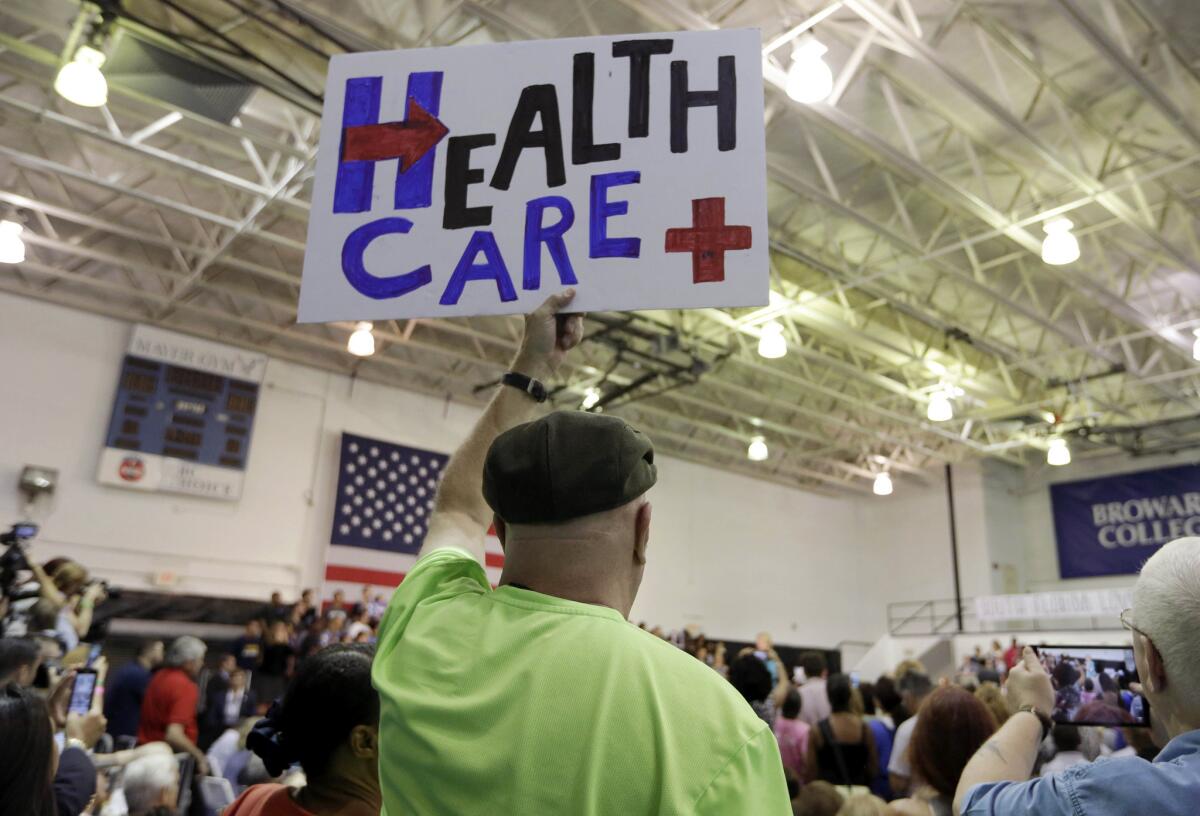How the debate over healthcare is changing - just in time for the 2016 election

A supporter of Democratic presidential candidate Hillary Rodham Clinton holds up a sign as Clinton speaks on Oct. 2, 2015, in Davie, Fla.
With the first primaries of the 2016 presidential campaign just months away, the national healthcare debate is poised to enter a new phase, more focused on consumers’ pocketbooks than on re-litigating the 5-year-old Affordable Care Act.
Hillary Rodham Clinton, who is campaigning on a detailed program to crack down on rising drug prices and runaway medical bills, is making a play for the hearts of voters increasingly irritated about what they have to pay for healthcare.
In the process, Clinton, the front-runner for the Democratic presidential nomination, has issued an implicit challenge to her Republican rivals, who continue to campaign with broadsides against Obamacare but few details about how they would address consumers’ basic healthcare worries.
“She is talking to people’s wallets … at a time when healthcare prices are a huge concern,” said Frank Luntz, an influential Republican strategist who helped develop the GOP’s highly successful campaign to tarnish Obamacare even before the law was enacted. “It’s smart.”
SIGN UP for the free Essential Politics newsletter >>
Clinton is highlighting her healthcare plans on a two-day swing through Iowa. “We have to be really focused on how we fix what we have so it works better for everyone,” she told a crowd in Davenport on Tuesday.
Clinton’s proposals may not resonate with the many Americans leery of more promises from the federal government, especially after President Obama pledged similar relief when he signed the current law in 2010. But the former first lady has focused attention on an agenda that, polls suggest, Americans want their elected leaders to take on.
Making high-cost drugs affordable should be the top healthcare priority for the next president and Congress, three-quarters of Americans said in a nationwide survey this year.
Most Americans also want their elected leaders to protect them from surprise out-of-network medical charges. They want government to ensure health plans have sufficient networks. And they want more information about the prices of doctors’ visits, tests and procedures, according to the poll, by the nonprofit Kaiser Family Foundation.
By contrast, fewer than half the respondents want their elected officials to deal with concerns about the Affordable Care Act. Just a third want it fully repealed.
“Health is really a pocketbook issue more than a political issue now,” foundation President Drew Altman said.
The evolution may reflect in part Republicans’ waning repeal campaign.
Five-and-half years after its enactment, the law has survived two major legal challenges and three national elections. And, contrary to opponents’ warnings, it has extended coverage to millions of Americans without destroying the existing employer-based system that most in the U.S. rely on for health insurance.
But another factor is likely driving Americans’ concerns about drug prices and medical costs.
Over the last decade, the average deductible that workers must pay for medical care before their insurance kicks in has more than tripled from $303 in 2006 to $1,077 today, according to a recent report on employer-provided coverage from the Kaiser Family Foundation and the Health Research & Educational Trust.
That is seven times faster than wages have risen in the same period.
At the same time, nearly a third of Americans with private health insurance have received a bill in which they were charged more than they had expected to have to pay, a recent nationwide Consumer Reports survey showed.
In response, Clinton is proposing a series of new restrictions on insurers and drug makers.
Among other things, she would put a $250 monthly cap on how much consumers could be required to pay out of pocket for medications. She would allow consumers to buy pharmaceuticals abroad, where they are often substantially cheaper.
Clinton also would create a new tax credit that Americans could use to help defray their out-of-pocket medical bills.
Insurers would be required to cover at least three doctor visits annually that aren’tsubject to a deductible.
And doctors who are providing care at a hospital that is in-network would be prohibited from charging patients out-of-network prices.
Clinton is also pushing broader policies to clamp down on the pharmaceutical and insurance industries, including restrictions on drug advertising and new federal oversight of insurance rate hikes. She would also allow the federal government to negotiate lower drug prices for Medicare beneficiaries, something that could save billions of dollars but is currently prohibited.
Vermont Sen. Bernie Sanders, an independent challenging Clinton for the Democratic nomination, is proposing his own six-point plan for reducing drug prices, including allowing the federal government to negotiate Medicare drug discounts.
NEWSLETTER: Get the day’s top headlines from Times Editor Davan Maharaj >>
Some experts have dismissed parts of Clinton’s agenda as unrealistic, especially her proposal to require drug makers to spend more on research.
But this kind of consumer-focused agenda holds great promise for Democrats who’ve been paralyzed by the GOP’s long campaign against the Affordable Care Act, said Celinda Lake, a veteran party strategist. “This is a post-Obamacare message … that has something for the insured, as well as the uninsured,” she said.
In contrast, none of the leading GOP candidates has a healthcare plan, though Florida Sen. Marco Rubio published a Fox News opinion piece in March calling for broad changes to the healthcare system, including deregulation of insurance markets to lower costs.
The most detailed healthcare plan in the Republican field was put forward by former Wisconsin Gov. Scott Walker; he dropped out of the race two weeks ago.
Despite the lack of specifics, the GOP’s simple anti-government, anti-Obamacare message still resonates with large swaths of the electorate, however.
Although huge majorities of Americans complain about drug prices, for example, substantially fewer support government intervention.
In one recent national survey from market research firm YouGov, 86% of respondents said drug prices were either “far too high” or “a little too high,” yet only 50% said they would support “the federal government controlling the price of prescription drugs.”
ALSO
Why are oil trains crashing? Track problems could be to blame
Obama seeks backing from both parties for Pacific Rim trade deal
Cannabis Club TV: Perfect buds of useful pot-themed programming
More to Read
Get the L.A. Times Politics newsletter
Deeply reported insights into legislation, politics and policy from Sacramento, Washington and beyond. In your inbox three times per week.
You may occasionally receive promotional content from the Los Angeles Times.







